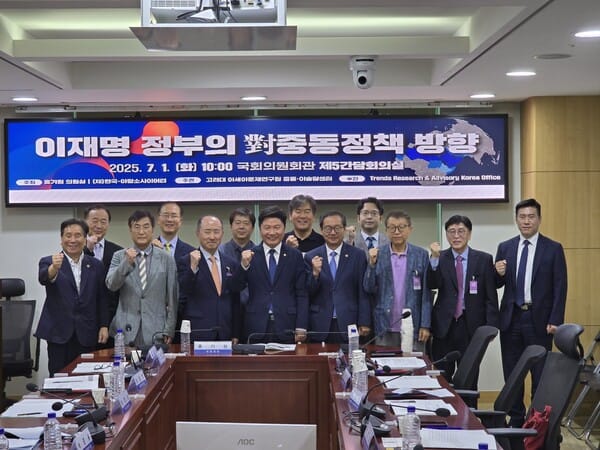A policy seminar held at South Korea’s National Assembly under the patronage and participation of TRENDS Research & Advisory Korea Office called for a pragmatic foreign policy toward the Middle East based on South Korea’s national interests and responsive to the region’s rapid transformations.
The high-level seminar took place in Meeting Room 5 of the National Assembly Members’ Office Building, organized with the support of TRENDS Korea Office in Seoul, in cooperation with Representative Hong Ki-won, the Korea–Arab Society, and the Center for Middle East and Islamic Studies at the Asiatic Research Institute, Korea University.
Participants in the seminar — The Middle East Policy Direction of the Lee Administration — stressed the need to shift from the traditional view of the region as merely a source of energy or a market, toward a strategic partnership built on mutual understanding and shared interests.
In his opening remarks, Kim Chang-mo, Secretary-General of the Korea–Arab Society, noted that the complexities of the regional landscape require Korea to pursue a balanced diplomatic approach that reflects its growing global stature
Representative Hong Ki-won emphasized that while the Middle East has always been important, it has not received the attention it deserves in Korean policy. He added that this seminar provides an opportunity to reassess this approach, especially at the start of President Lee’s administration.
Lee Jin-han, Director of the Asiatic Research Institute, highlighted the importance of launching urgent intellectual initiatives to keep pace with emerging challenges in the Middle East and to assist policymakers in shaping more effective strategies.
In his keynote address, former ambassador Yoon Kang-hyun described the Middle East as a vital hub linking three continents, with significant executive and economic potential. He called for independent diplomacy toward each subregion, moving beyond formal agreements toward genuine cooperation, appointing special envoys to priority areas, and enhancing people-to-people and cultural exchanges.
On the economic front, Dr. Lee Kwan-hyung, Senior Research Fellow at Korea Institute for International Economic Policy (KIEP), stressed the need to reduce reliance on the energy sector. He proposed expanding cooperation into new sectors, accelerating the ratification of the Free Trade Agreement with the Gulf Cooperation Council, supporting Korea’s involvement in the India–Middle East–Europe Economic Corridor (IMEC), and advocating for a Korea–Middle East summit.
The discussions featured several ambassadors and experts, including Ma Young-sam, former ambassador to Israel; Park Jong-young, former ambassador to Saudi Arabia; Kim Duk-il, Director of the Political Economy Department at Korea University; and Kim Jong-doo (Musa), Director of TRENDS Korea Office.
The seminar concluded with several key recommendations, including strengthening official development assistance (ODA) programs, developing trust-based diplomacy, and establishing a dedicated research institute focused on Middle East affairs from a long-term strategic perspective.



